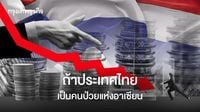As Thailand grapples with its economic challenges, concerns are mounting about its position within the ASEAN region. Many neighboring countries are experiencing significant growth, raising alarms that Thailand could be left behind, potentially becoming the "sick man of ASEAN." Dr. Sopon Pornchokchai, a prominent figure in the Thai real estate sector, has raised these issues, drawing parallels with past economic narratives.
In the past few decades, Thailand has enjoyed a relatively strong economic standing in Southeast Asia. However, recent developments suggest that this status is under threat. Countries like Vietnam, Indonesia, and the Philippines are rapidly advancing, with forecasts indicating that their economies may soon surpass Thailand's. For instance, the Philippines is expected to have a larger economy than Thailand in the near future, while Indonesia's GDP per capita is approaching 70% of Thailand's.
Dr. Sopon recalls his visits to China, where he noted that the nation has transformed dramatically over the past few decades. In the 1980s, Chinese graduates earned significantly less than their Thai counterparts, but today, the situation has flipped. As of May 2025, China boasts a GDP per capita that far exceeds Thailand's, illustrating a stark shift in economic power.
In a recent discussion in Manila, the author highlighted how the Philippines is striving to enhance its economic standing, further emphasizing the competitive landscape for Thailand. Indonesia, which once lagged behind Thailand, has made substantial investments in infrastructure, including a high-speed train linking Jakarta to Bandung, a project that has been completed for over a year.
As these nations push forward, Thailand's economic growth has stagnated. The Thai economy has been characterized by low growth rates, with GDP fluctuations revealing a troubling trend. In 2020, the economy contracted by 6.2%, with subsequent years showing minimal recovery—1.6% in 2021, 2.5% in 2022, and only 1.9% in 2023. Projections for 2025 indicate growth may again drop to 1.6%. This stagnation raises questions about Thailand's ability to compete effectively within ASEAN.
Moreover, the Thai stock market, often seen as a barometer of the nation's economic health, has been described as reflecting "biased circumstances." Critics argue that the market has become distorted, failing to represent the true economic landscape. Significant stocks, such as DELTA, have disproportionately influenced the market's performance, raising concerns about market manipulation and regulatory effectiveness.
At a recent meeting of the Asian Development Bank (ADB) in Milan, Deputy Finance Minister Julapun Amornvivat addressed these economic concerns. He emphasized the importance of international cooperation, stating that all countries involved in the ADB discussions continue to have confidence in Thailand's economy. Julapun noted that the ADB's forecasts indicate a general decline in GDP across ASEAN, reflecting broader global economic trends.
In light of these challenges, the Thai government is under pressure to implement effective economic stimulus measures. Julapun indicated that the Ministry of Finance is actively working on strategies to enhance economic growth, particularly in sectors such as tourism and foreign investment. A comprehensive review of existing measures is planned to address the impacts of economic fluctuations on various sectors.
Furthermore, the ongoing Digital Wallet initiative, aimed at providing financial support to young citizens, has faced scrutiny regarding its implementation. Julapun assured that the Ministry of Finance is reviewing the details to ensure the program meets its objectives effectively.
As Thailand navigates these economic challenges, the need for a collaborative approach is paramount. Dr. Sopon has proposed several measures to enhance Thailand's competitiveness, including combating corruption, improving infrastructure, and fostering foreign investment. He advocates for a focus on sustainable development that prioritizes local labor, particularly the elderly, to stimulate economic activity.
While the challenges are significant, the potential for recovery and growth remains. Thailand's historical strength in the region can be revitalized through concerted efforts to adapt to changing economic dynamics. As neighboring countries advance, Thailand must harness its resources and capabilities to reclaim its position as a leader in ASEAN.
In conclusion, the narrative surrounding Thailand's economic future is one of urgency and potential. With proactive measures and a commitment to reform, Thailand can overcome its current hurdles and emerge as a resilient player in the ASEAN landscape. The call for unity among Thais to support their nation has never been more critical, as the future hinges on collective action and strategic foresight.





